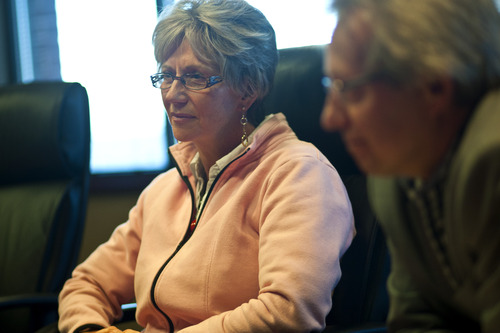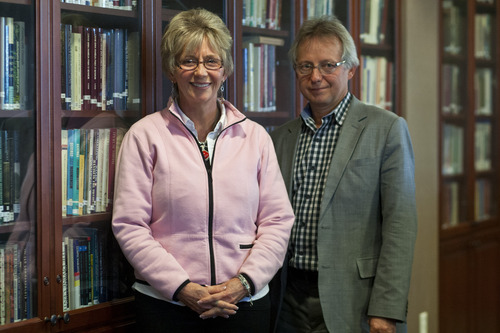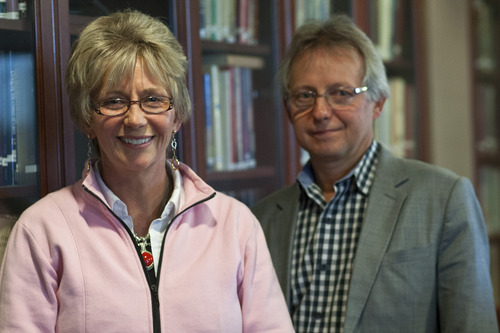This is an archived article that was published on sltrib.com in 2012, and information in the article may be outdated. It is provided only for personal research purposes and may not be reprinted.
In recent years, Fiona and Terryl Givens have been surrounded by smart, educated young Mormons who are abandoning their faith at an alarming rate, claiming it is intellectually unsatisfying.
The LDS husband and wife from Richmond, Va., were overcome with frustration and sorrow watching the exodus.
The Utah-based Church of Jesus Christ of Latter-day Saints cannot afford to lose these bright minds, the literary couple reasoned, and so felt an urgency to remind their disaffected friends of, as they put it, "Mormonism's theological gems."
The result is their just-published collaboration called The God Who Weeps: How Mormonism Makes Sense of Life.
It is, Terryl Givens says, "our prose hymn to the best and most beautiful in Mormonism."
The small volume explores five theological premises about God, mortality, human potential, universal salvation and the eternal nature of relationships. It tries to recover the loftier notions espoused by LDS Church founder Joseph Smith, many of which seem obscured to modern Mormons by a current culture more focused on heat than light and on side issues rather than core doctrines.
It weaves together salient LDS ideas with quotes from great poets and philosophers as diverse as Robert Frost and Søren Kierkegaard, showing how Mormon theology connects far beyond a religion launched in 19th-century America. In the process, the book dispels popular stereotypes about Mormon thinking as narrow and exclusionary.
"We wanted to present propositions," Terryl says, "that would radically resonate with Christians and spiritually minded people everywhere."
—
'Luminous' Mormonism • To some, the most surprising element is that such a theologically rigorous approach was published by an imprint of Deseret Book, the church's institutional press.
Indeed, it was Deseret Book's paucity of deeper books about LDS beliefs that prompted the project in the first place.
Last year, Terryl, a literature and religion professor at the University of Richmond, publicly criticized the LDS publishing arm for abandoning theology in favor of more chatty, anecdote-laden descriptions of Mormon teachings.
Deseret Book CEO Sheri Dew heard about it, he says, and offered to publish such a book if he would write it.
And now the book from Terryl and Fiona Givens is causing ripples of excitement throughout the Mormon intellectual community.
"This is the single best book of Mormon studies that I have ever read," Julie M. Smith of Austin, Texas, wrote on the Mormon blog timesandseasons.org. "It is brilliant and marvelously well-written."
In an email, Smith, who holds a master's degree in biblical studies from the Graduate Theological Union in Berkeley, Calif., said, "After LDS doctrine, history, practice, and rhetoric go through the refiner's fire, what is left is this book: a simply stunning articulation of everything that is luminous about Mormonism."
Ben Park, an LDS doctoral candidate at University of Cambridge, echoes that sentiment.
The co-authors "demonstrate the extraordinarily broad reach of Mormonism's answers, the intellectually cogent possibilities of LDS thought and the compelling nature of Joseph Smith's theological corpus," Park writes in an email from Boston, where he is spending this year. "Importantly, rather than just relying on the small canon of the LDS tradition, they reach further by showing how many theologians, philosophers and other figures can not only affirm what we already believe, but have much to teach us on these important issues. This is a book that all Mormons should not only read, but feel comfortable recommending to their friends."
Outsiders are already noticing it.
Robert P. George, McCormick Professor of Jurisprudence at Princeton, called the book "a work of theological reflection that has much to offer intellectually and morally serious men and women of every religious persuasion who ponder the mystery of a God who, though profoundly transcendent, reveals himself to us."
For Fiona Givens, the seed for the book was planted nearly a decade ago — in a place of suffering.
—
God's vulnerability • Born and reared in East Africa, Fiona, a retired high-school French teacher, was particularly troubled after seeing a film about African genocide. How could God stand to see this?
"It made me think about the god I worship," she says. "He is the only god who has made himself vulnerable, who has sacrificed himself for his creation. His vulnerability is sublime."
She found herself returning again and again to a section from LDS scriptures known as the Book of Moses in what is called The Pearl of Great Price. In it, God gives the ancient prophet Enoch a vision in which the forces of good and evil are locked in battle, and people are killed, die in natural disasters or are spiritually lost.
God wept at the sight, the book says, which puzzled Enoch, who wondered why one with infinite power and wisdom would be so moved.
"These are my creations and I have asked them to love one another and love me, yet they hate one another and are without affection," Fiona paraphrases God's answer. "Why should not the heavens weep, seeing these shall suffer?"
What amazes her is that God says nothing about "wickedness or evil." It is "their suffering that elicits God's compassion and empathy," she says. "For me, that became the core characteristic of the divine: by loving us, by exposing himself to all of the vicissitudes of life just as we do, we don't have a God who cannot be touched."
But what about Heavenly Mother?
—
Finding the divine feminine • Mormons believe God the Father has an eternal spouse, who is recognized and revered by the faithful but whose qualities are little known.
Heavenly Mother is mentioned briefly in the Givens book, but her unique character is not discussed.
The notion of divine parenthood pervades their theological exploration, Fiona explains, but the couple mainly wanted to rescue Heavenly Father from his reputation as "an angry, unmerciful, exacting God for much of Christian history."
They needed to show, she says, that God's divine attributes are "mercy, gentleness, kindness and long-suffering."
Women already are perceived that way, she says. "Would anyone have noticed Christ's sacrifice if he had been a woman? It is a given that women will sacrifice themselves for their children."
Rather, it was important for the book to show the strength of women, particularly in the figure of Eve.
A careful reading of the biblical book of Genesis, Fiona says, shows how Eve's decision to eat the forbidden fruit from the Tree of Knowledge of Good and Evil was essential for human development.
"After they have eaten the fruit, God says, 'They have become as one of us,' " Fiona says. "They've progressed closer to God."
Eve wasn't seeking power, but "the good, the true and the beautiful," Fiona says. "You can see this by the reasons she gives — the fruit was 'good to eat,' 'beautiful to the eyes,' 'aesthetically pleasing' and — this is crucial — 'it will make you wise.' "
That last point, she says, is the tipping point for Eve.
To have wisdom, even knowing it would exact a tragic toll and that she might be vilified for thousands of years, Eve makes that courageous move.
The Mormon faith tradition "reasserts Eve as the heroine of the human race," Fiona says. "Adam was playing computer games in another garden, while Eve was the one struggling with this momentous decision. It's brilliant."
The so-called Fall was not a fall, she says, but an ascent into mortality. And that makes the whole idea of becoming like God much more exciting and reasonable, she says, than a Broadway musical punch line about "getting your own planet."
Facebook.com/peggy.fletcherstack
Twitter: @religiongal —
Five central concepts in Mormon theology
God is a personal entity, having a heart that beats in sympathy with human hearts, feeling our joy and sorrowing over our pain.
We lived as spiritual beings in the presence of God before we were born in this mortal life.
Mortality is an ascent, not a fall, and we carry infinite potential into a world of sin and sorrow.
God has the desire and the power to unite and elevate the entire human family in a kingdom of heaven, and, except for the most stubbornly unwilling, that will be our destiny.
Heaven will consist of those relationships that matter most to us now.
Source: The God Who Weeps: How Mormonism Makes Sense of Life







